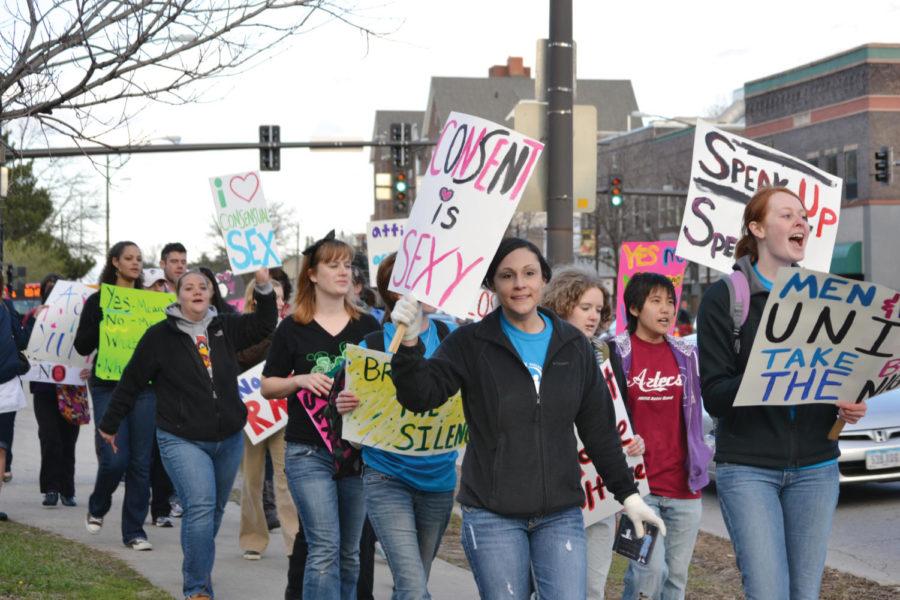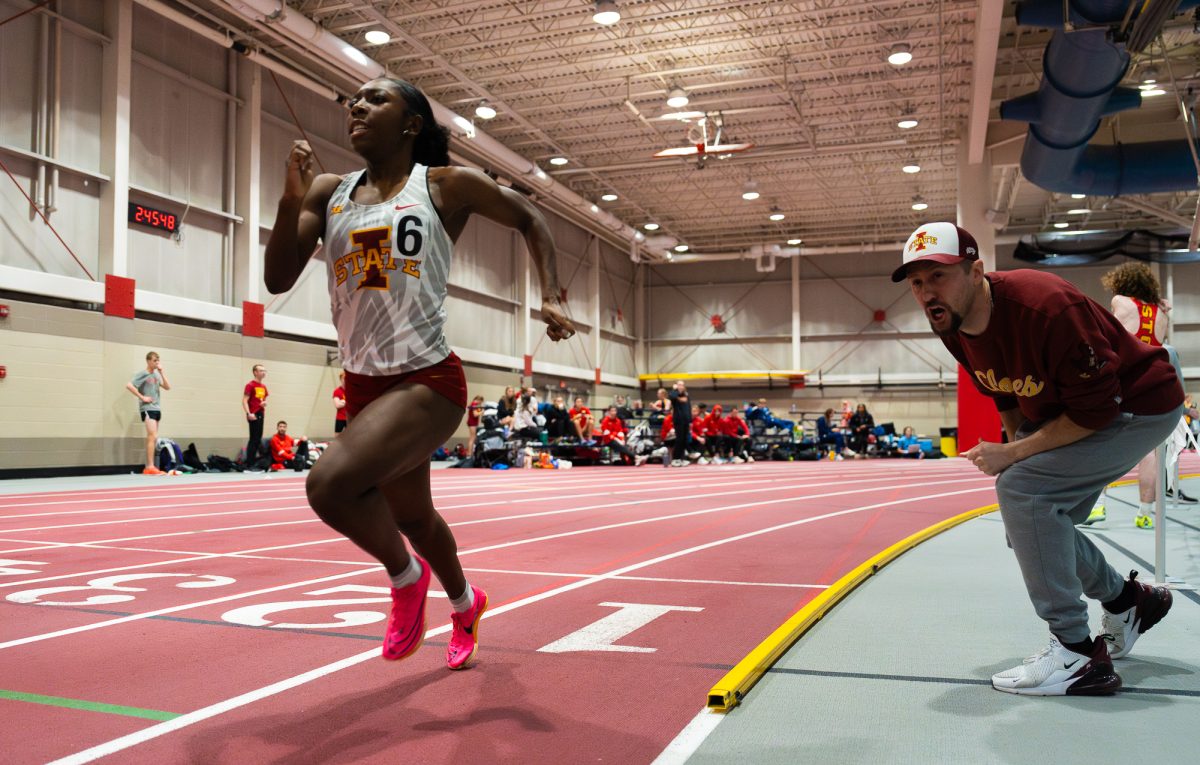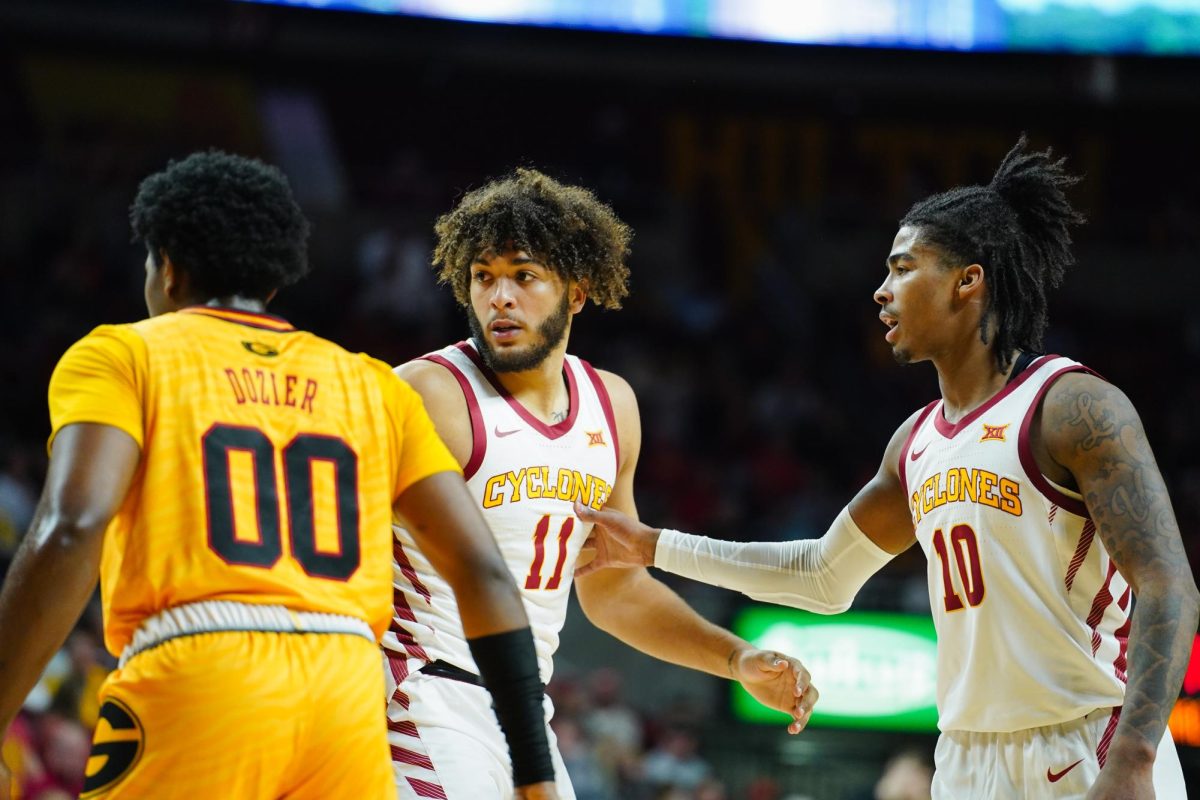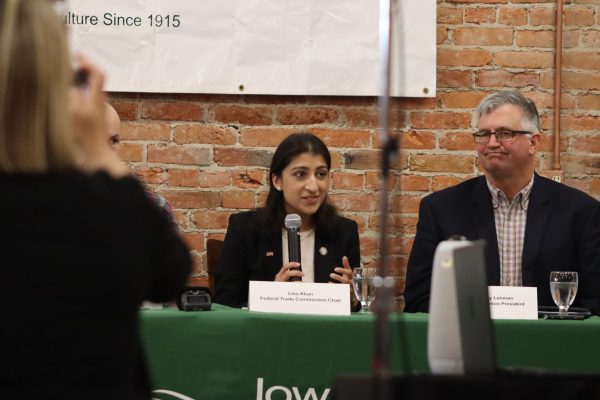Women, men march to ‘Take Back the Night’
Photo: Phuong Thao Nguyen/Iowa State Daily
Students march for Taking Back The Night, an event to raise awareness of violence against individuals April 20 on Lincoln Way. The events purpose is to raise awareness of violence.
April 20, 2011
“I learned. And when I learned, I found my voice. I told him, “f**k you” as I ran out of his house.”
Liz Steinborn, graduate in equity and social justice education, shared the story of her encounter with a sexual predator to a small crowd Wednesday night on the West Terrace of the Memorial Union. Steinborn was accosted by a close family friend, an incident that had drastic effects on her as a 16-year-old girl.
When she was younger, she lived in fear, but now she is a female rights activist.
She is one of several women from the Margaret Sloss Women’s Center that helped to organize the Take Back the Night rally and march as part of Sexual Assault Awareness Month.
“Why does the responsibility of keeping ourselves safe lie with us?” Steinborn said. “Why should my hair or my clothing dictate whether or not I’m targeted for sexual assault. Instead of being told how to stay safe, I say we demand our safety.”
Steinborn not only wanted to empower young men and women, she also helped to raise larger social questions.
Her speech continued to discuss what is often called the American “rape culture”; a concept that criticizes society for focusing on holding people responsible for their own safety to avoid sexual assault, rather than working to prevent sexual assault by educating people of the potential negative effects of their actions.
Several other speakers, including provost Elizabeth Hoffmann, Peter England, and Lesbian, Gay, Bisexual and Transgender Student Services coordinator Brad Freihoefer each shared the same theme of empowering men and women to stand up for their own rights and to hold perpetrators accountable for sexual crimes.
At the conclusion of Steinborn’s speech, the Campanile tolled and the small, but loud group of young women and a few men walked down the south steps toward Lincoln Way chanting, “Yes means yes, no means no. However we dress, wherever we go.”
The sun began to set over Friley Hall and cast a long, golden beam across a choppy Lake Laverne, sharing the surface with the reflection of a cloudy April sky.
The weather had little effect on the small, but dedicated marchers. Although this was a loud and jubilant event, some of the individuals present attended for much more personal reasons. One of such individuals was a young woman, Vicki, who was sexually assaulted.
“I was molested as a child, and I feel like I need to be here for other people,” she said as her voice broke. She began to weep.
“I want just to let other people know that there are families out there that will come out,” Vicki said. “There’s just people that don’t feel strong enough to tell anyone. I feel like that for the next generation we can stop this.”
Despite difficulty, Vicki visibly shared her experience, she called on ISU students to be active in combating sexual assault.
“I feel like students really don’t realize how hurtful people can be, or don’t pay attention to people’s actions and that they might be able to help someone if they pay attention,” Vicki said.
The march continued south on Lynn Avenue and turned west on Knapp Street before returning north down Welch Avenue. The march attracted stares from many onlookers and even picked up a few bystanders who marched alongside them for a short time.
Although there were mostly young women present, a few male students were also in attendance. They too, were beginning to understand the importance of sexual assault awareness.
“At the end of this, I feel more connected. It seems like there are many things happening behind the scenes that you don’t know about,” said Charles Kanube, graduate in biochemistry, biophysics and molecular biology. “Because it doesn’t happen to you, most of the time you don’t know about it.”
Despite being yelled at from open windows in Friley, the march continued through the arches and concluded at the Union Drive Community Center.
It was followed by an open mic night, in which those present were able to share their experiences in open discussion with their peers.
Steinborn said she was thrilled about the attendance and deemed the event a success. She had few reservations about sharing, and was optimistic about the effects of her efforts.
“That’s the first that I’ve told my story to a group of people that I wasn’t directly connected to. It was empowering, but it was scary,” Steinborn said. “I think being able to now communicate that with others is really important. Share your story. There are people who want to listen.”

















